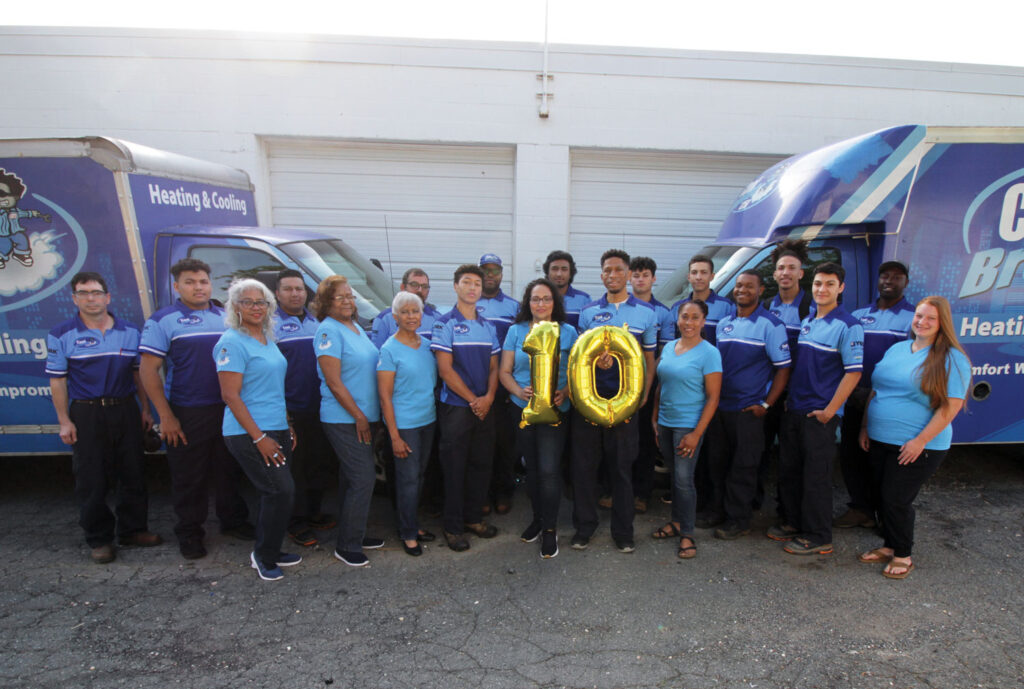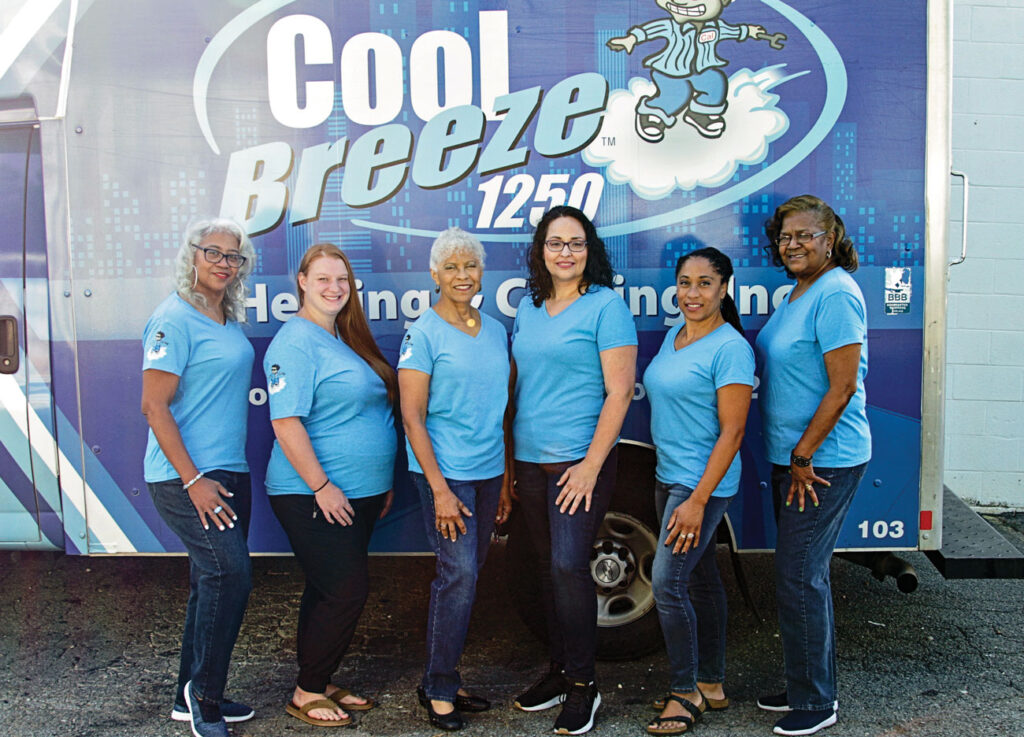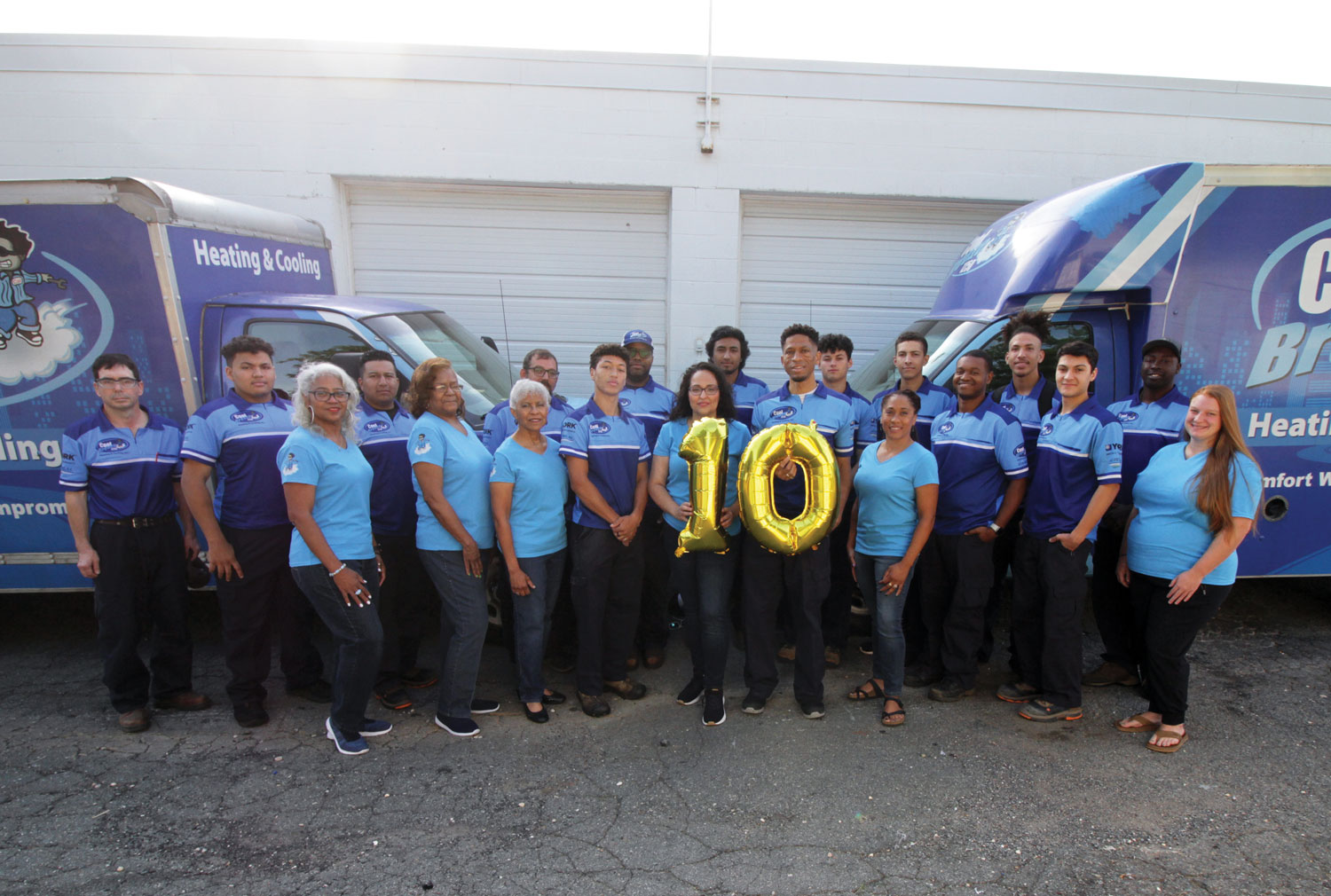Facts to Keep You Cool this Summer
By Amber Mabe

This summer has already brought with it record high temperatures and stifling humidity, and it is not over yet. For 20 years total and 10 years in the Triad, Stephen and Kesia Bagby and the team at Cool Breeze 1250 have been keeping their clients comfortable through heat waves and cold fronts. Despite patiently waiting for the B-positive kidney donor that he needs and spending the necessary countless hours performing dialysis, Stephen continues to work tirelessly to provide top-notch service to customers all over the Triad. Recently joined by Blue, the French Bulldog, the Cool Breeze 1250 family is a familiar and trustworthy name in home comfort. With all their experience, who better to tackle some common questions and misconceptions about home heating and air conditioning? Here is what they had to say:
Does setting the thermostat to a much lower temperature get your house to cool faster?
No, it does not. Only if you have a multi-stage HVAC unit would it help to do that. Most units should not be put down below 70 degrees, because you run the risk of icing up the system.
Does turning the system off when you leave the house save energy?
In most cases, if homeowners are going to be gone for several days it would help save energy. For a shorter amount of time, no, it would not.
What is a good temperature to set when you are not home?
Four degrees higher than what you keep it at normally. The air will not run as long as it would for your normal target temperature while still keeping it close to your desired comfort level for when you return.
Do ceiling fans make a difference in the house?
Fans are more about how the air feels on your skin. If you were using a technical instrument to measure the temperature with or without ceiling fans, you would not see a difference, but it does change the way we perceive the temperature. When the moisture on our skin evaporates, the moving air causes a cooling sensation. Fans should turn clockwise for the heating season and counterclockwise for cooling.
Do interior lights or unshaded windows affect the efficiency of your cooling system?
Unless you are using hot house lights to grow plants, lights will not affect your cooling. However, windows affect it a great deal. Especially if they are uninsulated, older windows. If your windows are facing east or west, they are going to affect your temperature more with that direct sunlight.
Does changing your filter monthly make a difference?
Definitely. A clean system runs better. It is important to change your filter when it is dirty. So whether that is every month, or if you are remodeling you might need to change it every week because of all the dust. Most standard air filters still let through 95% of smaller particles (below .3 microns) and that is what ends up dirtying up the inside of your system. We have new technology and cleaners that can capture those smaller particles. All manufacturers recommend having your AC systems serviced once a year, but duct cleaning can be done every 2-3 years.
What are some early warning signs that your system needs maintenance?
Sometimes you can hear a fan making an unusually loud sound. It could be a fan motor going bad. If the unit is taking a lot longer to heat or cool, there may be an issue developing.
Is it true that 9/10 HVAC system failures are caused by dust or dirt?
Yes. Freon leaks can often be traced back to evaporator coils that were not cleaned. The mixture of the aluminum or copper coils with moisture and the buildup of bacteria, fibers, dirt and other substances will cause erosion of the coils. The corrosion then eats through the metal of the coils or other parts of the system and causes leaks.
Is it true that a clean A/C system will lower your heating and cooling bill?
It makes a difference because the dirtier the system, the more it will cost to run it as it runs less efficiently. It is better to maintain it so that it does not get excessively expensive. Blower wheels, which are shaped sort of like water wheels, scoop the air to move it. If these have built up dirt and gunk, they will not be moving the air efficiently.
What percentage of an average monthly energy bill comes from cooling your house?
The average is probably 40-60 percent, depending on the age of the system, the condition of it, and of course how much you choose to use it.
How much of a difference does it make to have two separate cooling systems in a multi-level home?
For one thing, you have redundancy so if one system happens to go down you have a backup. It does better control the temperature of upstairs and downstairs if the systems are separate. Zoning your current unit can also achieve different temperatures using one system, if your house is not conducive to installing a second upstairs system due to a lack of space or access for new ducts. Mini-split systems are less invasive and are capable of running heat in one room and AC in another room simultaneously. Of course, having two systems will accomplish this better. If you want a ten-degree difference in different parts of the house, a separate system is a better choice. It may not necessarily save money, but it can make your house more comfortable.
Can a programmable thermostat save you money?
Yes. There are systems we install that allow you to connect to and monitor your thermostat remotely. It constantly monitors your system and notifies the homeowner and the contractor anytime it detects abnormalities or problems that may be forming. For people who have rentals or travel and need to know if their system is still performing correctly, Sensi Predict can give them peace of mind.
How much do properly insulated and caulked windows affect heating and cooling?
A lot. In fact, if a homeowner is considering installing a new system, we usually ask them if they plan on updating their home insulation and windows within the next year, because this will affect the size of the system we need to install in the home. Proper insulation can keep you from having a larger-than-necessary system installed and running in your home.
Are there systems that are more environmentally friendly than others?
Definitely. The newer systems are more environmentally friendly, because they run more efficiently and are not wasting energy. Older furnaces run at anywhere from 70-80% efficiency, whereas newer models will run at 90-95% efficiency. This means you are not wasting money or energy with these newer models. With air conditioners, some people think it is normal other substances will cause erosion of the coils. The corrosion then eats through the metal of the coils or other parts of the system and causes leaks.
Is it true that a clean A/C system will lower your heating and cooling bill?
It makes a difference because the dirtier the system, the more it will cost to run it as it runs less efficiently. It is better to maintain for a system to get low on refrigerant and need to be recharged, but it is not. Older units use a refrigerant called r22, which is damaging to the environment and has been discontinued and phased out. In fact, it is illegal for technicians to recharge these systems in commercial buildings without first checking for and repairing any leaks. The newer formula, r410a, is much more environmentally friendly. If it does accidentally leak out, it is less damaging to the environment. Newer systems also use less energy, and properly maintained ducts will prevent energy loss caused by leaks. We use a well-known product called Aeroseal to fix duct leaks for our clients.
Just for fun, what do you keep your thermostat on at home?
We call it the battle of the thermostat. A lot of husbands and wives differ on this. Kesia likes it cooler at night when she is sleeping. She prefers a temperature of about 72, but when she is not home Steven will change it to 78 because he likes it warmer.

IF YOU’RE LOOKING FOR AC REPAIR IN KERNERSVILLE, LOOK NO FURTHER!
When you need HVAC experts you can trust 24/7, turn to Cool Breeze 1250 Heating & Cooling, Inc.
Call 336.497.1250 to request service. 24-HOUR EMERGENCY SERVICE AVAILABLE!

